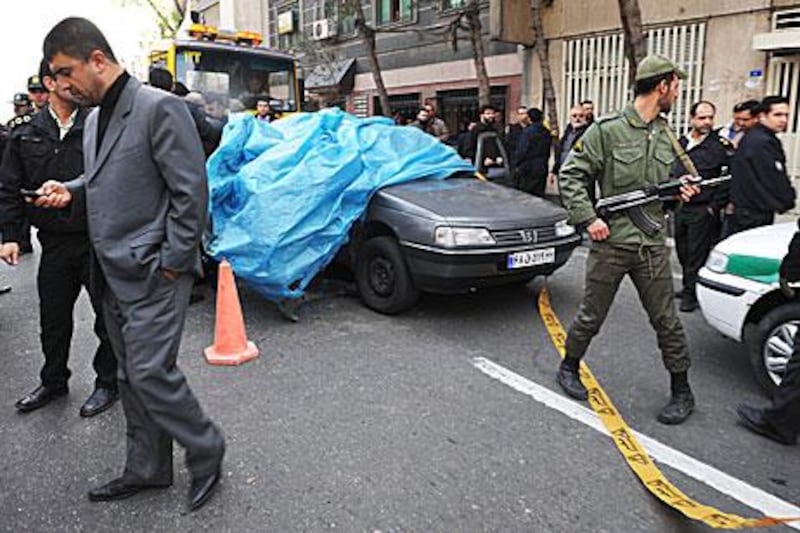An Iranian university professor working at a key nuclear facility was killed in a car-bomb attack yesterday that Tehran immediately blamed on Israel and the US.
Two men on a motorbike attached a small magnetic bomb to Mostafa Ahmadi Roshan's Peugeot 405 in a busy street outside a university campus, and sped off before it exploded.
Mr Roshan, 32, died instantly. A pedestrian was also killed and another person in the car was badly injured.
Mr Roshan was the fourth Iranian scientist to be killed in similar blasts in Tehran in the past two years. Iran views the attacks as part of a covert campaign of bloodshed and cyber-sabotage led by Israel's Mossad intelligence service and aimed at disabling Tehran's cherished nuclear programme.
That strategy would be less risky than conventional military strikes against Iran's dispersed and fortified nuclear sites, which could send oil prices rocketing and trigger retaliatory attacks against Israel and US bases in the region. It would also be directed at intimidating Iran into making compromises on its nuclear programme.
But an infuriated Tehran showed no sign of backing down yesterday. The Iranian parliament's national security and foreign policy held an emergency session to debate a response to the "terrorist act".
Iran's vice president, Mohammad Reza Rahimi, said "Zionists" and "those who claim they are against terrorism" were responsible for Mr Roshan's death. Iran's Atomic Energy Organisation vowed that "America and Israel's heinous act" would not deflect Iran from developing nuclear technology.
The assassination during morning rush hour in north Tehran came amid heightened tensions over Iran's nuclear programme, which Iran insists is peaceful in nature but the West believes is aimed at achieving a weapons capability.
The US and European Union are escalating sanctions and Iran is threatening to close the Strait of Hormuz in retaliation. A third of the world's tanker-borne oil passes through the narrow waterway at the mouth of the Gulf and the US and Britain have vowed to keep it open, by force if necessary.
The chief of the US navy, Admiral Jonathan Greenert, acknowledged that a potential conflict in the Strait caused him to lose sleep.
"If you ask what keeps me awake at night, it's the Strait of Hormuz and the business going on in the Gulf," he told a Washington think tank on Tuesday. He said the US would not be "taking its eye off the ball" in the Middle East as it looks to strengthen its military presence in the Asia-Pacific region.
Iran's dead scientists
January 11, 2012 Mostafa Ahmadi Roshan, a chemistry expert and a director of the Natanz uranium enrichment facility in central Iran, is killed by a bomb attached to his car, Fars news agency reports.
July 2011 Motorcycle-riding gunmen kill Darioush Rezaeinejad, an electronics student. Other reports identified him as a scientist involved in suspected Iranian attempts to make nuclear weapons.
January 12, 2010 Masoud Ali Mohammadi, a senior physics professor at Tehran University, is killed when a bomb-rigged motorcycle exploded near his car.
November 2010 Bomb attack kills Majid Shahriari, a member of the nuclear engineering faculty at Shahid Beheshti University in Tehran. The current head of Iran's atomic organisation, Fereidoun Abbasi, is wounded in a separate attack
Mr Roshan, a chemical engineer, was the assistant to the head of procurement at the Natanz uranium enrichment facility, according to Fars news agency, which is close to Iran's Revolutionary Guards who are charged with protecting scientists.
Tehran's deputy governor, Safar Ali Baratloo, said the device that killed Mr Roshan was the same as those used in the assassination of other scientists and was "the work of the Zionists". The attack was also part of a conspiracy to reduce the turnout at Iranian parliamentary elections on March 2, he said.
It coincided with the anniversary of an explosion that killed a Tehran University professor, Massoud Ali Mohammadi, 50, in 2010. Mr Roshan was due to attend a memorial service for him yesterday, Iran's semi-official Mehr news agency said.
In November 2010, a pair of back-to-back bombings in different parts of Tehran killed one nuclear scientist, Majid Shahriari, and injured another, Fereidoun Abbasi. The latter, who left his car with his wife just before the explosion, is now head of Iran's atomic energy agency.
Israel and the US have denied previous Iranian allegations of a dirty war targeting Iran's nuclear scientists. But Israeli officials have hinted about covert campaigns against Iran without directly admitting involvement.
Israel's military chief, Lt Gen Benny Gantz, said on Tuesday that 2012 would be "a critical year" for Iran, in part because of "things that happen to it unnaturally".
Iran was condemned by the West this week for beginning uranium enrichment to a higher level at another site, the virtually impregnable underground bunker at Fordo near the holy city of Qom.
Tehran also ratcheted tensions with Washington on Monday by sentencing a former US marine of Iranian descent to death on a charge of spying for the CIA. The charge was robustly denied by the family of Arizona-born Amir Mirzaei Hekmati, 28, and by the administration of Barack Obama, the US president.
Despite growing tensions, on Tuesday a US Coast Guard cutter rescued six Iranian sailors from a vessel in distress in the Gulf. It was the second time in days that the US navy, underscoring its reach in the region, had delivered Iranian seamen to safety.
Last Thursday it rescued 13 Iranian fishermen who had been held captive by pirates in the northern Arabian Sea, just outside the Gulf, for more than 40 days.





